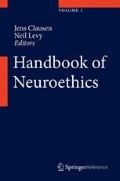Abstract
Dissociative identity disorder (DID) has been a subject of fascination to clinicians, philosophers, and the general public for well over a century. There are many reasons for this, not the least of which is the way in which this disorder challenges ordinary understandings of personal identity. It is not easy to say how many people are present in an encounter with a DID patient. Since facts about personal identity are intimately connected to prudential reasoning and the assignment of moral responsibility, perplexity about identity in these cases has potentially important practical implications. This chapter offers a theoretical framework for the fruitful investigation of questions of personal identity in DID in the form of the Narrative Self-Constitution View which argues that individuals constitute themselves as persons by developing and operating with an implicit autobiographical narrative in which they apply the normative constraints of personhood to their own lives. The Narrative Self-Constitution View does not deliver a definitive answer to the question of how many persons one is confronted with in encountering a DID patient, but it does provide important insights into why a definitive answer should not be expected and sheds light on the role of embodiment in personal identity. The further value of this approach is demonstrated by showing how it can illuminate questions of moral and criminal responsibility in DID.
Access this chapter
Tax calculation will be finalised at checkout
Purchases are for personal use only
References
Baylis, F. (2012). The self in situ: A relational account of personal identity. In J. Downie & J. Llewellyn (Eds.), Relational theory and health law and policy (pp. 109–131). Vancouver/Toronto: UBC Press.
Behnke, S. H. (1997). Assessing criminal responsibility of individuals with multiple personality disorder: Legal cases, legal theory. The Journal of the American Academy of Psychiatry and the Law, 25(3), 391–399.
Bruner, J. (1990). Acts of meaning. Cambridge, MA: Harvard University Press.
Coons, P. M. (1988). Psychophysiologic aspects of multiple personality disorder: A review. Dissociation, 1(1), 47–53.
Dennett, D. (1992). The self as a center of narrative gravity. In F. Kessel, P. Cole, & D. Johnson (Eds.), Self and consciousness: Multiple perspectives (pp. 103–115). Hillsdale: Erlbaum.
Dorahy, M. J. (2001). Dissociative identity disorder and memory dysfunction: The current state of experimental research and its future directions. Clinical Psychology Review, 21(5), 771–795.
Eich, E., Macaulay, D., Loewenstein, R. J., & Dihle, P. H. (1997). Memory, amnesia, and dissociative identity disorder. Psychological Science, 8(6), 417–422.
Eliot, G. (1985). Middlemarch. Middlesex: Penguin Classics.
Goldie, P. (2012). The mess inside: Narrative, emotion & the mind. Oxford: Oxford University Press.
Loewenstein, R. J., & Putnam, F. W. (1990). The clinical phenomenology of males with MPD: A report of 21 cases. Dissociation, 3(3), 135–143.
Loftus, E. F. (1993). The reality of repressed memories. The American Psychologist, 48, 518–537.
Merckelbach, H., Devilly, G. J., & Rassin, E. (2002). Alters in dissociative identity disorder: Metaphors or genuine entities? Clinical Psychology Review, 22, 481–497.
Olson, E. (1997). The human animal: Personal identity without psychology. Oxford: Oxford University Press.
Piper, A., & Merskey, H. (2004). The persistence of folly: A critical examination of dissociative identity disorder. Part I. The excesses of an improbable concept. Canadian Journal of Psychiatry, 49(9), 592–600.
Reinders, A. A., Nijenhuis, E. R., Quak, J., Korf, J., Haaksma, J., Paans, A. M., Willemsen, A. T., & den Boer, J. A. (2006). Psychobiological characteristics of dissociative identity disorder: A symptom provocation study. Biological Psychiatry, 60(7), 730–740.
Ricoeur, P. (1992). Oneself as Another. (trans.) Kathleen Blarney. Chicago: University of Chicago Press.
Schechtman, M. (1996). The constitution of selves. Ithaca: Cornell University Press.
Schechtman, M. (2011). The narrative self in Shaun Gallagher. In S. Gallagher (Ed.), The Oxford handbook of the self (pp. 394–418). Oxford: Oxford University Press.
Taylor, C. (1989). Sources of the self. Cambridge, MA: Harvard University Press.
Author information
Authors and Affiliations
Corresponding author
Editor information
Editors and Affiliations
Rights and permissions
Copyright information
© 2015 Springer Science+Business Media Dordrecht
About this entry
Cite this entry
Schechtman, M. (2015). Dissociative Identity Disorder and Narrative. In: Clausen, J., Levy, N. (eds) Handbook of Neuroethics. Springer, Dordrecht. https://doi.org/10.1007/978-94-007-4707-4_113
Download citation
DOI: https://doi.org/10.1007/978-94-007-4707-4_113
Published:
Publisher Name: Springer, Dordrecht
Print ISBN: 978-94-007-4706-7
Online ISBN: 978-94-007-4707-4
eBook Packages: Humanities, Social Sciences and Law

